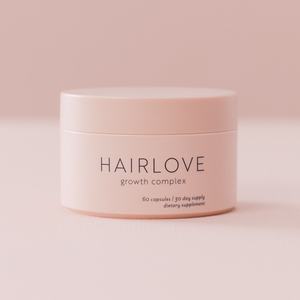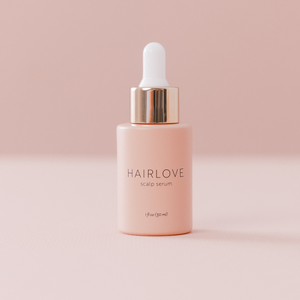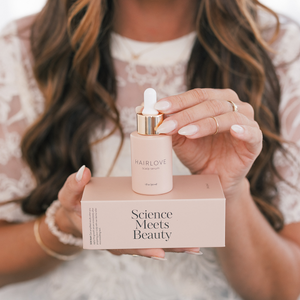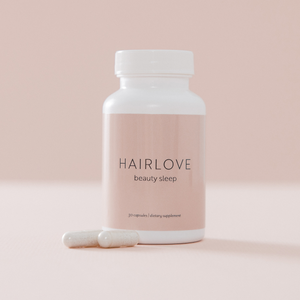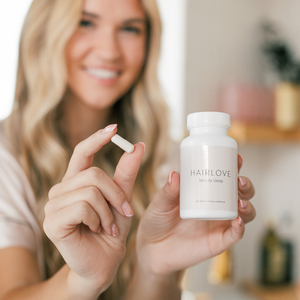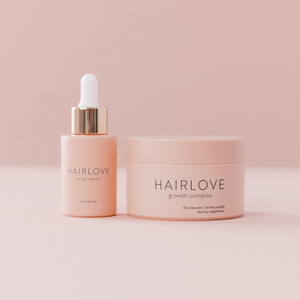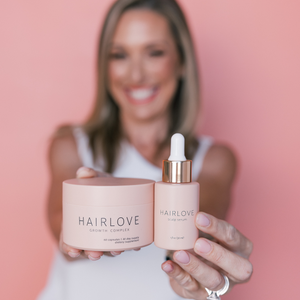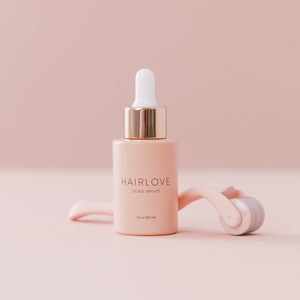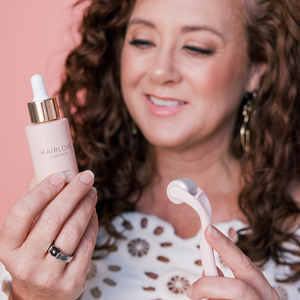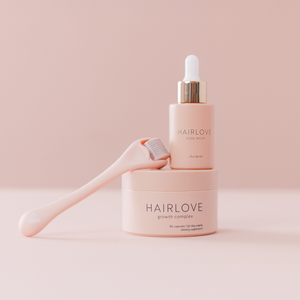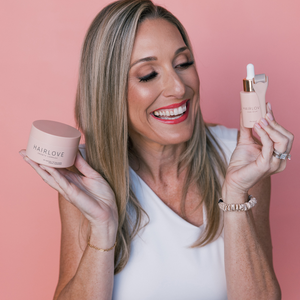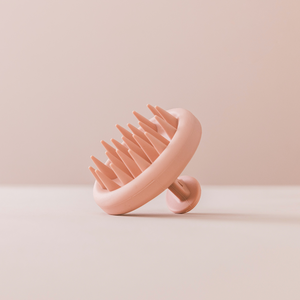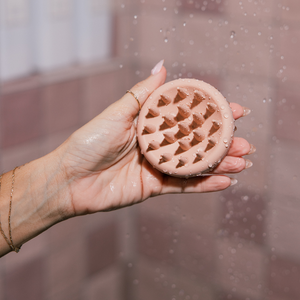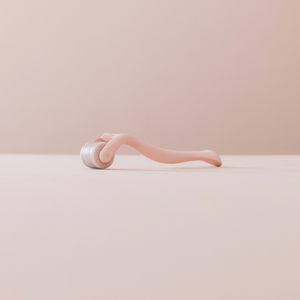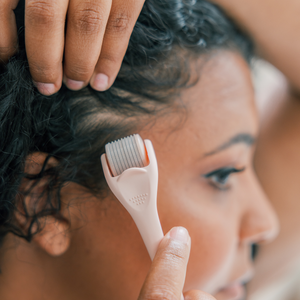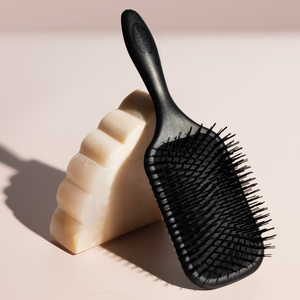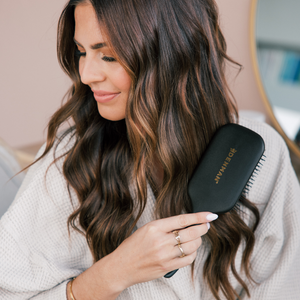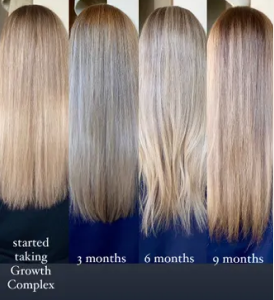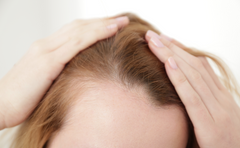As women, we’re used to fluctuating hormones and the ups and downs of our time of the month. It can cause us all sorts of annoyances, from acne to bloating to headaches. But outside our regular hormone fluctuations, did you know that hormonal imbalance can trigger hair loss? If you’ve been pulling more hair out from your shower or hair brush, or notice your hair isn’t growing out like normal, the secret culprit may just be your hormones.
Today, let’s talk about:
- Key hormones for your hair growth
- What disrupts your hormones and hair growth
- How to balance hormones naturally for healthy hair
Hormones and Hair Growth for Women
So what are the key hormones for women’s hair growth and hair loss? Let’s look at the major players: estrogen, testosterone, and thyroid hormones.
Estrogen
Estrogen is the primary female sex hormone, and it plays a crucial role in various processes, including reproductive health. Here are the main ways estrogen helps hair growth:
- Hair growth cycle. Estrogen supports the activation of hair follicles and encourages them to enter the anagen phase, or active growth phase, of the hair growth cycle. Higher estrogen levels mean more time in the anagen phase, allowing hair to grow for an extended period before transitioning to the catagen (transition) and telogen (resting) phases.
- Hair thickness. Estrogen is essential for maintaining overall hair thickness and quality. During the anagen phase, estrogen promotes the production of thicker and more robust hair strands.
- Protective effects on hair and scalp. Estrogen has protective effects on hair follicles, which reduces the likelihood of starting the catagen or telogen phases prematurely. Plus, estrogen helps minimize hair shedding and contributes to a healthy scalp environment.
How Does an Estrogen Deficiency Affect Hair Growth?
Since estrogen lengthens the anagen phase, an estrogen deficiency can cut the anagen phase short and instead lead to more time in the shedding phase. Also, low amounts of estrogen can cause thinning and finer hair strands since hair thickness is linked with estrogen.
Estrogen levels naturally fluctuate throughout the menstrual cycle, and they are typically at their lowest during the early part of your menstrual cycle, known as the follicular phase. Thankfully, this is just temporary. Later in life, during menopause, estrogen levels naturally decline, which can lead to permanent changes in hair texture and an increased susceptibility to hair loss.
Another important mention to make here is pregnancy. During pregnancy, your hair is living its best life — more shine, more thickness, and overall more healthy. This is because of the increased estrogen while pregnant. After giving birth, your estrogen levels drop drastically, which is why so many women experience postpartum hair loss and the hair condition telogen effluvium. The good news is that for most women, this isn’t forever. Your hormones will stabilize and your hair cycle will normalize again.
Testosterone
Testosterone is primarily known as a male sex hormone, but it exists in both men and women. It belongs to the group of androgenic hormones. When balanced, testosterone is a good thing for your hair. During the anagen phase of the hair growth cycle, testosterone stimulates the development and maintenance of hair follicles. It also contributes to the initial growth and thickness of hair strands.
How Does a Testosterone Imbalance Affect Hair Growth?
Testosterone can be converted into dihydrotestosterone (DHT) by the enzyme 5-alpha-reductase. While testosterone supports hair growth, an excess of DHT is linked to hair thinning and loss. DHT can bind to receptors in hair follicles, leading to a process called miniaturization, where the follicles shrink over time and produce finer hair. This may trigger or worsen the hair loss condition androgenetic alopecia, also known as male and female pattern baldness.
The balance between testosterone and estrogen is a big deal for healthy hair growth. Disruptions in this balance, such as an excess of DHT or hormonal imbalances, can contribute to hair loss conditions.
Thyroid Hormones
Thyroid hormones — including thyroxine (T4) and triiodothyronine (T3) — play a key role in regulating metabolism, maintaining the health of hair follicles, and supporting normal hair growth. Thyroid hormones influence the entire hair growth cycle, and adequate levels of thyroid hormones support the anagen phase for active growth.
How Does a Thyroid Imbalance Affect Hair Growth?
When your hormones are out of whack, it can really hurt your hair growth journey. Thyroid imbalances are either hypothyroidism or hyperthyroidism. In cases of hypothyroidism, where thyroid hormone levels are low, hair may become brittle, dry, and prone to breakage. On the flip side, hyperthyroidism, where thyroid hormone levels are elevated, can lead to hair thinning and increased shedding.
A thyroid imbalance also disrupts your hair growth cycle. Low thyroid function, or hypothyroidism, can lead to a shorter anagen phase and decreased hair growth. Thyroid disorders can also cause a shift in the balance of hair follicles entering the telogen (resting) phase. An excess of hair in the telogen phase may lead to increased shedding.
What Disrupts Your Hormones and Hair Growth?
Several factors can trigger hormonal imbalances and hair loss, including the following:
- Chronic stress. Prolonged or chronic stress can dysregulate the hypothalamus-pituitary-adrenal (HPA) axis. This leads to elevated cortisol levels and impacts your hormones.
- Environmental toxins. Exposure to endocrine-disrupting chemicals in the environment, such as certain pesticides and plastics, can interfere with hormone function.
- Genetics. Your genetics can influence hormone production, receptor sensitivity, and overall hormonal balance.
- Lack of physical activity: Sedentary lifestyles may contribute to hormonal imbalances. Regular exercise helps regulate hormone levels and supports overall health.
- Medications. Some medications — including hormonal contraceptives, corticosteroids, and certain antidepressants — can impact hormone levels. While birth control helps regulate menstrual cycles, it can also influence hormonal balance and some women may not respond well.
- Poor diet. Inadequate nutrition, high sugar intake, and a lack of essential nutrients can disrupt hormone production and balance.
- Puberty, pregnancy, and menopause. As mentioned earlier, natural life stages such as puberty, pregnancy, and menopause involve significant changes that can temporarily disrupt hormonal balance.
- Sleep deprivation. Insufficient or poor-quality sleep can disrupt your balance of hormones, including cortisol, insulin, and growth hormone.
- Weight gain or obesity. Excess body fat, especially abdominal fat, can lead to insulin resistance and disrupt hormonal balance, contributing to conditions like polycystic ovary syndrome (PCOS).
How to Balance Hormones Naturally for Healthy Hair
If any of this sounds familiar or is something you’re experiencing, don’t give up — there’s ways to naturally balance hormones and give your hair the support it needs!
Healthy Lifestyle
Sometimes when your body is out of balance, it helps to just get back to the basics. Living a healthy lifestyle does a world of good for your hormones and overall health.
First off, a balanced diet can give your body the nutrients it needs for healthy functioning. Ensure your diet includes a variety of hormone-balancing foods such as fruits, healthy fats, lean proteins, vegetables, and whole grains. These provide essential vitamins and minerals vital for hormonal function and hair health. Check out this article for a full list of nutrients that support healthy hair.
Second, don’t forget to plan for regular physical activity, such as aerobic exercises, strength training, or yoga. Exercise promotes blood circulation, which is crucial for delivering nutrients to the hair follicles and maintaining a healthy scalp. But beyond that, exercise is also an effective stress-reliever.
Last but not least, prioritize getting quality sleep each night. Sleep is essential for the body's overall regeneration and hormonal regulation. Plus, sleep supports the production of melatonin, a hormone that regulates sleep-wake cycles and also has antioxidant properties good for hair health. For extra help getting much-needed rest, try our Beauty Sleep Complex.
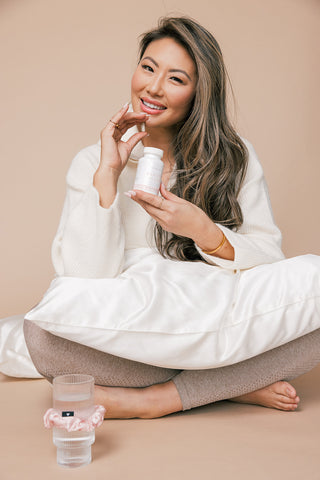
Natural Ingredients for Hormone Support
Balancing hormones is complex, but you can get help from various nutrients and vitamins for hormonal imbalance. Here’s a list nutrients or supplements that impact your hormones and hair growth:
- Adaptogens (like ashwagandha, holy basil, and rhodiola) may help the body adapt to stress and modulate the stress response, influencing hormonal balance.
- B vitamins (including B6, B12, and folate) are involved in hormone synthesis and metabolism.
- Iodine is crucial for the production of thyroid hormones.
- Iron is involved in the production of red blood cells and supports overall health, indirectly influencing hormonal balance.
- Magnesium is essential for numerous enzymatic reactions in the body, including those related to hormone production.
- Omega-3 fatty acids, especially EPA and DHA, have anti-inflammatory properties and may support hormonal balance.
- Probiotics support gut health, and a healthy gut microbiome is linked to hormonal balance.
- Selenium is essential for the synthesis and activation of thyroid hormones.
- Vitamin A is essential for the synthesis of sex hormones like estrogen.
- Vitamin D is involved in hormone regulation, and its deficiency has been linked to hormonal imbalances.
- Vitamin E acts as an antioxidant and may support hormonal health.
- Zinc is involved in the synthesis and function of various hormones, including insulin and sex hormones like estrogen.
Some of these nutrients you can intake through your diet. But in some cases, you may have a hard time getting enough of certain nutrients that are essential for hormone function and also for healthy hair. That’s one reason why many of these nutrients are ingredients in our product, Growth Complex. Our natural formulation is designed to promote new hair growth, help reduce shedding, and strengthen your hair.
Stress Management
The last item on the list is stress management. Chronic stress triggers the release of cortisol and adrenaline, disrupting the balance of various hormones. Prolonged elevation of cortisol levels can affect reproductive hormones, thyroid function, and insulin regulation. This is bad news for your hair growth cycle and overall health.
That’s why effective stress management practices are so helpful for your hair and overall health. Some activities that can help lower stress include aromatherapy, deep breathing exercises, gratitude journaling, meditation, nature walks, tai chi, and yoga. Or, it can be as simple as self-care activities, like doing something you love, taking a relaxing bath, or spending undisturbed time with loved ones.
Practicing more stress management in your life — along with these other lifestyle changes and hormone-supportive nutrients — can make a big difference for your hormones, hair, and health.

